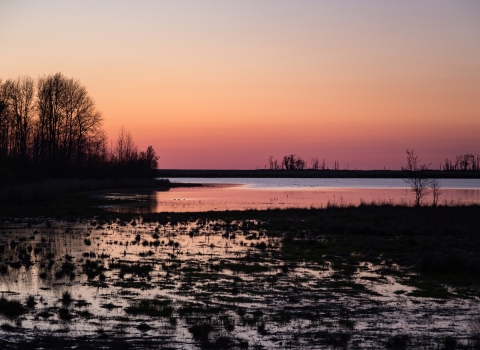SACRAMENTO, Calif.— The U.S. Fish and Wildlife Service is soliciting public input following its receipt of an incidental take permit application from Sierra Pacific Industries for the federally threatened northern spotted owl and California spotted owl.
This public engagement precedes the Service’s preparation of a draft environmental impact statement that will analyze the impacts of several permit alternatives covering certain logging activities. The process provides an open and transparent way for the Service to solicit the best and most up-to-date information on which to base its permitting decisions. If granted, the permit would allow for limited impacts (called “incidental take”) to northern spotted owls and California spotted owls as an unintended consequence of the company’s ongoing activities.
The Endangered Species Act provides for such unintended impacts to protected species through the incidental take permit process. The process enables the Service to work proactively and collaboratively with the permit applicant to eliminate harm to the maximum extent possible and compensate for any unavoidable harm. In this way, the conservation needs of the species are met yet balanced with the needs of industry and the economy.
The Service is working with Sierra Pacific on a Habitat Conservation Plan (HCP) that will describe the expected impacts to the two owl species as a result of the company’s timber harvesting and management activities on 1.6 million acres in portions of California’s Amador, Butte, Calaveras, El Dorado, Lassen, Modoc, Nevada, Placer, Plumas, Shasta, Sierra, Siskiyou, Tehama, Trinity, Tuolumne and Yuba counties. The HCP will ensure take is minimized and mitigated; it also outlines how the company will monitor its impacts and adapt to changes it observes throughout the permit period.
Today’s announcement opens a 30-day public scoping process which ends September 22, 2017. Interested parties can provide comments about the scope of the draft environmental impact statement analysis. Scoping meetings will be held as follows:
September 13, 2017 September 14, 2017
5:30 p.m.-7:30 p.m. 1:30 p.m.-3:30 p.m.
Hilltop Holiday Inn-Buckskin Room CDWR-Bonderson Bldg.-Hearing Room
1900 Hilltop Drive, Redding, CA 96002 901 P St., Sacramento, CA 95814
Comments received or postmarked after September 22, 2017, will be considered to the extent practicable. Written comments will be accepted at public scoping meetings, by mail, fax or in person at the Sacramento Fish and Wildlife Office, 2800 Cottage Way, Suite W-2605, Sacramento, CA 95825; or by facsimile 916-414-6713 attention: Kim S. Turner. Those using a telecommunications device for the hearing impaired can call the Federal Information Relay Service: 800-877-8339.
In addition, the Service will host an online webinar on Thursday, September 14, 2017, from 5:30 p.m.–7:30 p.m.—pre-registration at the following website is required: https://goo.gl/jDURZD. Before including an address, phone number or other personal identifying information in comments, the public should be aware that the entire comment—including personal identifying information—might be made publicly available at any time.
A copy of the notice of intent was published in today’s Federal Register Reading Room. For more information about the draft environmental impact statement and scoping meetings, visit www.fws.gov/sacramento.
Comments can be sent via U.S. Mail or facsimile to:
Kim S. Turner
Conservation Planning Assistance Division
Sacramento Fish and Wildlife Office
U.S. Fish and Wildlife Service
2800 Cottage Way, Room W-2605
Sacramento, California 95825
Fax: 916-414-6713
The U.S. Fish and Wildlife Service works with others to conserve, protect, and enhance fish, wildlife, plants, and their habitats for the continuing benefit of the American people. For more information about our work and the people who make it happen, visit www.fws.gov/Sacramento. Connect with us via Facebook, Twitter, YouTube, and Flickr.
-FWS-


